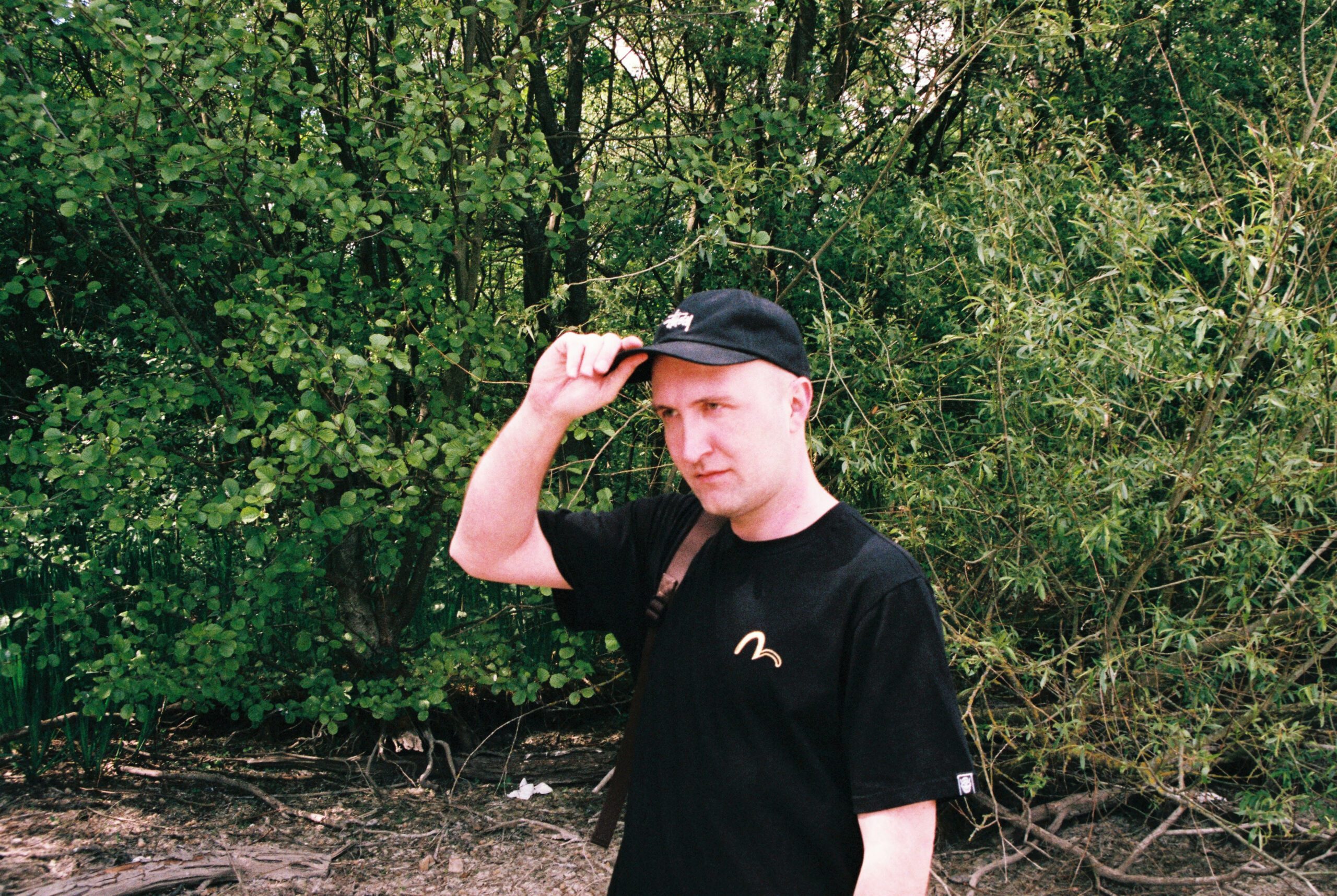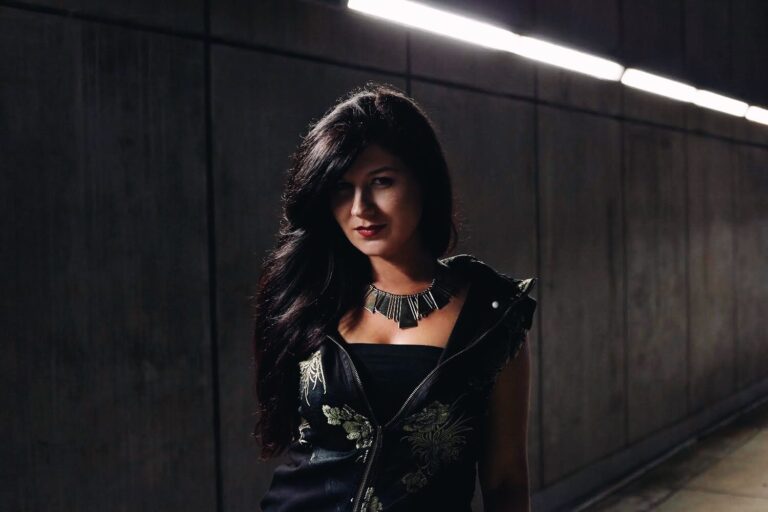“It put the zap on my head…”
This is how Anthoney Hart describes his first encounters with electronic music, as a wide-eyed 10-year-old in 1990. Over 30 years later, it’s still zapping him.
If anything, he feels more zapped than ever. After years of various aliases and investigations, most recently exploring and subversively flipping his jungle and pirate radio roots in experimental 130BPM mutations on notable leftfield labels such as Planet Mu as Basic Rhythm, Anthoney has recently returned to one of his earliest musical love affairs: drum & bass.
It’s a move he could never have anticipated or forecast, having fallen out of love with D&B pretty severely in the early 2000s. Now fully inspired by the openness of the scene, and how much more welcoming and appreciative the genre is compared to the leftfield bass realm he was previously operating in, he’s returned with a whole stack of schematics. First up is Turning Me On, a cosmic space piece on Tim Reaper’s Future Retro, backed up with a hefty Gremlinz remix.
Plenty more is expected to follow, both on his own label Raw Basics and beyond. We called Anthoney up to find out more…
You’re back in the realms of D&B….
Yeah. I guess for me it was a specific set of circumstances. I’m not a first-generation jungle bod but I was listening since then. My older brother was a DJ and was putting early warehouse parties in the late 80s. He was sending tapes to my older sister, which I duly stole from her bedroom and they blew me away. It was like, ‘Okay this is my music’. Before that I’d just been exposed to my mum’s taste of music, all 60s stuff essentially, but this felt like music for our generation.
So that was me from the age of 10. I moved back to London age 12 and was listening to pirate radio from then on, and started playing on pirate radio from the late 90s. First Force FM, which had come from the same people who ran Unity. Then I moved over to Rude FM. But I’d say by 2003 I felt drum & bass had become incredibly formulaic, that there was a lot of gatekeeping going on and it was very hard to push through. So around 2003 my interest was fizzing out a bit.
There was a lot going on in the early 2000s; breaks, UKG, dubstep, grime…
Yeah, but I ended up moving into IDM, experimental electronics, noise and contemporary classical. The early electronic masters and composers like Morton Subotnick, Varese.
You’re the first person to namecheck Morton Subotnik in a UKF interview!
Ha. He’s a very important figure! Everything we do today is in debt to what he and other early electronic pioneers did, to certain degrees. Essentially though, I’d felt D&B had become very stagnant, very macho and very trend-based. You’d have someone break through with something successful and everyone would emulate that.
It happens all the time but between 2003–10 it had become too self-referential. Very square, very blocky, very cliquey and you’d have these clubs full of white middle class kids with backpacks moshing. It was too removed from working class UK and Caribbean rudeboy culture for me to relate to.
But then, around 2010, I felt it was opening back up again and I think the music has blossomed since then. People are open to more new ideas than they have in years and labels like CNVX are a great example – the standard is high and Kid Drama is not afraid to take risks and push that experimental sound. That’s one of a lot of labels and artists doing creative things within the form.
I’d agree with that. What’s interesting is that around 2010 D&B also got incredibly mainstream with chart hits and things. So maybe it almost took it to get to that mainstream to trigger that experimental kneejerk reaction? It’s also interesting that around that time Damon Kid Drama was part of Instra:Mental doing very experimental things with dBridge and the autonomic sound…
Yeah. I never played much of that stuff, but would agree it was a necessity. They took influences from IDM, which was interesting. That’s when the music is at its best – when it’s drawing on external influences outside of the genre. Otherwise it becomes a parody of itself.
100% agree. Was there a key moment where you started to get back into D&B?
I guess I never fully stopped. I was doing the mixes – originally for FACT Mag – and was buying the occasional bits by artists like Overlook and Fracture, little things here and there. And one of my closest friends is Tim Reaper. He’s spent the last 10 years trying to get me back on board and get involved. I made some things back in 2013 which Loxy, Scotty and Storm were all playing. I even had an alias for them. But the Basic Rhythm stuff had developed into its own thing and had taken its own direction at that point, so I went with it.
But then you got jaded with that side of the music, right?
Yeah. With the whole ‘bass scene’ system. Someone once described grime to me as ‘not a scene, but a loose collection of egos.’ I felt that could describe the bass scene, too. Just a bunch of people jumping onto new trends every six months. The press attention and fascination on jumping on hype sounds and trends was the same.
Whereas in drum & bass, it really is a tangible scene. You can go to gigs on your own and see heads and regulars. It’s not closely-knit or unified but there is definitely a community at the core.
That’s why I’ve come full circle to drum & bass! I know there’s a lot of culture vultures hanging around looking for hype and trend stuff but, at its core, it does its own thing. And while I’ve flirted with other things, I’ve always come back and it’s always welcomed me.
The other things I’ve done have given me experience, and I’ve learnt a lot from it all, but it’s drum & bass where I feel most welcome. Across the arts there’s a widespread domination of middle class homogenisation but when I come back to D&B I still see people like me. I don’t necessarily mean white working class men but people from all walks of life with similar backgrounds and connections. There’s an immediate rapport. You can play to an audience you feel you can connect with. Over the years I’ve toured Japan, I’ve played Berghain and all these places most DJs would dream of playing, but I’ve not felt a connection with the crowd at all.
How did that make you feel?
Really depressed! When I first got into this music in 1990 first of all it was like, ‘Holy shit this is my music, I need to make it!’ It put the zap on my head. Then after that my aspirations were simple: learn how to make this music, cut dubs, play them on pirate radio and in the club.
Over the decades the whole music world has changed as much as it possibly could and I found myself negotiating a system that’s being touted as something freer and more experimental but it’s just a mirror of the mainstream corporate structure.
I was being interviewed in magazines with Beyonce on the cover. Why the hell was I doing that? I’d also ended up on what would appear to be a great agency who looked after the Aphex Twins and Autechres of the world and they’d put me on these line-ups which people would think were incredible but I couldn’t relate at all. I had to quit them. I was playing on techno line-ups when I didn’t play a single note of techno. I quickly realised I didn’t want to do these gigs, I just felt I should do them. It made me very depressed. Some people might see me leaving Planet Mu as a step back in my career but for me it means I can focus on those original goals – make music l love, cut it to plate, play it on the radio, play it in the club.
Back to your roots
Exactly! And all this other stuff is bollocks. That eco-system of agents and management and big festival bills, they don’t care about creativity at all. It’s like that Oscar Wilde quote – fashion is a form of ugliness that’s so intolerable we need to change it every six months. It’s an exploitative cycle. So I’m happy I can now do things I love.
To do that, during the times we’ve had, is quite a bold move. I’m assuming tours in Japan, gigs in Berghain and all that type of world pays better than underground drum & bass. So you’ve released the pressure but also probably felt that financially?
You’d be surprised. Everyone’s mugging you off left, right and centre. But when you’re poor you’ll have no option but to take these piss take offers and they know that. And even when you know when something is worth a hell of a lot more, if there are no other offers, then what are you going to do? That said, I don’t give a fuck about money, I’ve walked away from a lot of projects and had a lot of different aliases in the past.
You kept the Basic Rhythm alias even though you’ve come back to drum & bass, though…
Yeah I did. I think because the stuff I was doing under that name relates to the new stuff. But it does feel like I’m starting from scratch again. What else am I going to do, though? Do stuff I’m not happy about for a pittance? It’s not like I’ve given up on the chance to earn millions, so I need to focus on things makes me happy.
Totally! You can hear that, too. Basic Rhythm music has had a confrontational edge in the past but Turning Me On has a space disco vibe to it. Really interesting halftime arrangement.
Thanks. It’s a summer vibe for sure. The sample is from a group called Coil. It had that shimmery summer vibe and, for me, the percussion and bass actually nods towards the 96-era Dillinja vibe. Or tracks like Bambaata. I send everything to Tim Reaper and he into this one especially. I also wanted Gremlinz to remix it because the original is so removed from anything he’s done and I wanted that sense of total contrast.
A lot of the things I’ve got coming after that does have more of the older breakbeat sounds. I think because the Basic Rhythm project was all about taking my pirate radio, jungle roots to new contexts and I was using all these old rave sounds – I decided to not use breakbeats because I didn’t it to sound like a throwback. That’s why I made angular rhythms with my own patterns. I hear so much throwback 130 breaks stuff with a rave sample and breakbeats, it’s boring. It’s been done before. I find all that reinvention stuff boring as well.
I do like how there’s a renewed interest in vinyl and the foundations, though…
There’s some interesting stuff, for sure. Guys like Sully, for example. He’s very forward thinking. But in general there’s a pseudo jungle simulacrum. It’s about replication rather than innovation. They’ll find out what kit was used and try to get that specific kit. There’s no imagination. It’s like a Beatles cover band and this irritates me because jungle was about the future and how it rolled forward with the technology.
Jungle was about moving forward and trying new things. But this throwback stuff fails immediately because it’s trying to recreate the past. Hardcore and jungle was the definition of modernism. It took from the past and threw itself into the future. So this new stuff is a pale imitation of what was happening then.
And then, to add to that, you’ve got these old farts being like ‘oh I’ve just found this old DAT’. It’s like, ‘really?’ The reason why it never came out then was because it wasn’t good enough. I want to hear new ideas! I’m not trying to reinvent the wheel, by the way…
But neither are you relying on old jungle tropes
Exactly. I’ll bring in elements of drill or other references of things I love and also reference my own roots with rave samples. And the whole reason I fell in love with all of this back then was because I was pig sick of my parent’s generation and all the elders saying how you’ll never get better than the 60s. I’ve always said that I hope the same thing never happens to hardcore – and now it is happening. And most the people saying that weren’t even there at the time!
When people would sample 60s and 70s records in the 90s, we’re in that era now in the 2020s – people are echoing what they’ve been brought up. I get that. I’m not so into the idea of actively seeking the old machines to do it. It’s not very DIY.
It’s boring as fuck. And it’s boujie middle class lads who were making hip-hop a few years ago. I understand that bare people will think I’m a c**t for saying that, but it’s how I feel.
There’s a pleasure from archivism and understanding how it’s made, though…
But the production standard is so bad! And they wholesale take a break loop and roll it out. There’s no variation at all. No drum layering or processing. They’re lower production standards than the early 90s. And it’s because these people don’t come from hardcore and early jungle. I call it the FACT Mag effect. A build-up of the last six or seven years. I’m not interested in what middle class people think is trendy. The same with RA. It does make me wish I hadn’t left D&B in the first place. I mean, I’m glad I’ve been on that journey, but perhaps I should have done it privately.
Nah, you’re richer for it and you’ve been welcomed back. For me that’s testament to the best side of drum & bass. The strongest currency is what you bring to the table and how much you know your shit.
You’re right. I’ve only come back in the last year or so, but when I made the decision to come back, I hit up everyone I knew from back in the day and new people I’m into and almost all of them have been happy to collaborate and been happy to receive dubs from me. I’ve got works in progress with loads of different people and it’s really inspiring and exciting.
Yet trying to do that in the sphere I was in previously in? Impossible. Just people who are too cool for school. For me it’s about the art of creativity and collaboration. I’ll learn something from it and hopefully whoever I’m collaborating with will learn from it, too. I want to create as much as possible. That’s the most exciting thing and what I believe this music was founded on. I’m not sure this was possible a few years ago in D&B but it’s happening now and it’s really fucking inspiring! Like Damon, he’s been championing everything I’ve sent him. That speaks volume to me. Or Resound. I didn’t know him personally, but I hit him up, sent him an idea, he said ‘yes’, he worked on it and sent it back and I finished it and now we have a tune. At its best D&B has a very gregarious nature. It’s open and welcoming – you can connect with people and forge connections. That’s rare in electronic music.
Yes! I couldn’t agree more. That’s the essence.
I’m so open to doing these things. There is a community thing going on and it really reminds me of going to Music House. Hanging out with Leon (RIP) and chatting to the people passing through. I was still doing that up until a few years ago. I was cutting dubs from 96 all the way through. All these other areas I’ve worked in there would be the odd person who’d be up for collaborating but they’re few and far and between – it’s mainly full of middle class douche bags who are too busy thinking of being cool and what to post on their Instagram or stardom or anything that doesn’t related to creativity.
Amen! So what creativity can we expect next?
So the Future Retro release is out now. Then my last Planet Mu release will follow, which is a jungle release with a Loxy remix. It’s quite traditional jungle but with a contemporary edge. Then, after that, is the first proper D&B release on my label Raw Basics called Dread, which will be out in February or March. Following that I have some more contemporary things dropping on Sneaker Social which are less breakbeat driven with a minimal sound and jazzy atmospherics. Then an EP on CNVX but I’ve got no idea on its release. So yeah, loads of stuff. The futures looking good man…
Basic Rhythm – Turning Me On is out now on Future Retro
Follow Basic Rhythm: Instagram / Soundcloud


